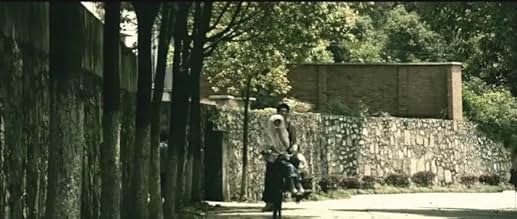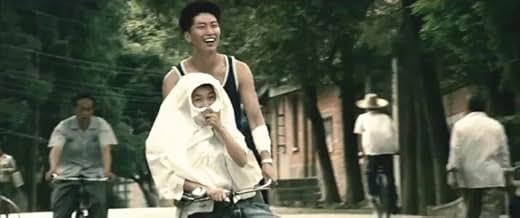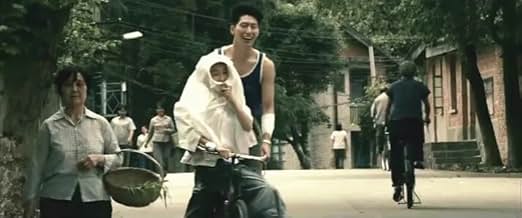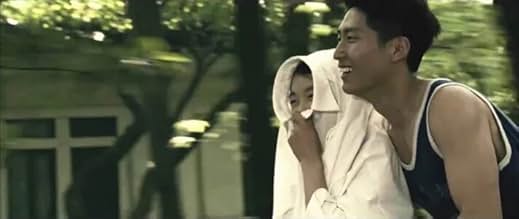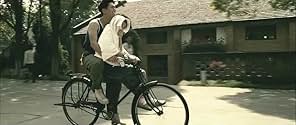Shan zha shu zhi lian
- 2010
- 1h 54m
ÉVALUATION IMDb
7,1/10
3,9 k
MA NOTE
Ajouter une intrigue dans votre langueRomance sparks between a young woman and a young man from different economic backgrounds during China's Cultural Revolution of the 1960s and '70s.Romance sparks between a young woman and a young man from different economic backgrounds during China's Cultural Revolution of the 1960s and '70s.Romance sparks between a young woman and a young man from different economic backgrounds during China's Cultural Revolution of the 1960s and '70s.
- Prix
- 10 victoires et 12 nominations au total
Cheng Taishen
- Teacher Luo (Luo Laoshi)
- (as Taishen Cheng)
Jinsong Wang
- Director Li (Li Zhuren)
- (as Qi Ke)
Liping Lü
- Wei's Mother (Weihong Muqin)
- (as Liping Lv)
Histoire
Le saviez-vous
Commentaire en vedette
There is a scene, about two thirds of the way through, in which an older woman, mother to three children, sits down with her eldest daughter and the boy she has fallen in love with, and for about five minutes, they speak to each other. These are hard times – all three know it. At the beginning of the scene, the mother is sceptical. She treats the two as children, with their heads in the clouds. But the conversation develops, and gradually, we realise a change in the mother. She cannot back down – in practical, surviving terms, she is in the right. But she softens her approach, and by the end, even has a kind of basic respect for the two, behind her frosty exterior. For she has seen the love that these two have for each other, and recognised it. It was then that I knew I was watching a great movie
If 'Lola' was a disappointment in the Asia Triennial Film Festival this year, Zhang Yimou's new film – a love story set during the Chinese Cultural Revolution – makes up for it tenfold. It's not very often I get the opportunity to rave about a film like this, as they are so rarely done well; cynicism, plot complication and saccharine cliché at turns are what often makes a love story such as this horrifically superficial and painful to watch. But Yimou knows what he is doing. Arguably the finest working Chinese director (with the masterpieces 'Raise The Red Lantern', 'Hero' and 'House of Flying Daggers' to his name), he has succeeded here in making a beautiful, heartfelt film, spilling over with the love and care that has gone into its production.
Zhang Jingqiu is a student sent to do research and write a report for her school on a small village in Yichang City. She stays with the head of the village and his family. While there, she meets Sun, a geology student. What follows is inevitable. But how delicately rendered it is: Jing is the most beautiful, innocent young woman Sun has ever seen, and Jing, emotional and vulnerable, is amazed by him. Love at first sight! But this isn't as whimsical as it sounds. Yimou hasn't completely forgotten his political ideals and ability for scathing criticism: with this latest endeavour, he explores just how stifled and suffocating Mao's regime was for everyone under his power, and the emotional deadlock that threaten to destroy his protagonists at every turn. Frolicking, even in the most innocent sense of the work, was risky; Sun and Jing are from different classes, exacerbating the issue. Were they to be found out, her life and ambitions to work as a teacher would be ruined.
I was unsure, during the first half of the film, what to think. Yimou makes some interesting structural choices as regarding his narrative – many of the scenes are divided by inter-titles, telling us of an event we are not allowed to see, and then moving on to its aftermath. Most directors would die before doing this – especially in a film requiring the emotional impact this needs – and, I admit, I doubted its benefits at first. But instead of hindering the drive of the plot, Yimou has used it in such a way – not to cut the film into a digestible running length, but simply to avoid over melodramatics, and focus (almost entirely) on the couple in question. Supplementary information is given to us by other means – the filmed scenes are belong exclusively to Yimou's exploration of our two protagonists' relationship. It works perfectly.
Of course, we all know the rules. Both lovers are alive at the beginning; the same cannot be said after the end credits begin to roll. What makes this movie so wonderful isn't its startling originality; it isn't going to revolutionise cinema as we know it, or spark off long lasting controversy. Rather, what we are offered is a little less prestigious, but by no means less special. What we find is emotional honesty – when we start to cry at the end, we don't feel cheated; instead, we revel in the director's success. More importantly, though, we have felt for his characters, having engaged with them completely, and have a kind of renewed respect for the kind of pure, unconditional love we have been shown. The film is yet another example of Yimou's mastery of the 'anti-melodrama' – much like his early work, this is incredibly restrained, beautifully measured and patiently observed, shot through with a warmth and tender humanity that shouldn't inspire anything but admiration. Cynics – stay away. But for all the romantics out there (of which I, admittedly, am one), I couldn't recommend this more highly. Simply put, it's exquisite.
If 'Lola' was a disappointment in the Asia Triennial Film Festival this year, Zhang Yimou's new film – a love story set during the Chinese Cultural Revolution – makes up for it tenfold. It's not very often I get the opportunity to rave about a film like this, as they are so rarely done well; cynicism, plot complication and saccharine cliché at turns are what often makes a love story such as this horrifically superficial and painful to watch. But Yimou knows what he is doing. Arguably the finest working Chinese director (with the masterpieces 'Raise The Red Lantern', 'Hero' and 'House of Flying Daggers' to his name), he has succeeded here in making a beautiful, heartfelt film, spilling over with the love and care that has gone into its production.
Zhang Jingqiu is a student sent to do research and write a report for her school on a small village in Yichang City. She stays with the head of the village and his family. While there, she meets Sun, a geology student. What follows is inevitable. But how delicately rendered it is: Jing is the most beautiful, innocent young woman Sun has ever seen, and Jing, emotional and vulnerable, is amazed by him. Love at first sight! But this isn't as whimsical as it sounds. Yimou hasn't completely forgotten his political ideals and ability for scathing criticism: with this latest endeavour, he explores just how stifled and suffocating Mao's regime was for everyone under his power, and the emotional deadlock that threaten to destroy his protagonists at every turn. Frolicking, even in the most innocent sense of the work, was risky; Sun and Jing are from different classes, exacerbating the issue. Were they to be found out, her life and ambitions to work as a teacher would be ruined.
I was unsure, during the first half of the film, what to think. Yimou makes some interesting structural choices as regarding his narrative – many of the scenes are divided by inter-titles, telling us of an event we are not allowed to see, and then moving on to its aftermath. Most directors would die before doing this – especially in a film requiring the emotional impact this needs – and, I admit, I doubted its benefits at first. But instead of hindering the drive of the plot, Yimou has used it in such a way – not to cut the film into a digestible running length, but simply to avoid over melodramatics, and focus (almost entirely) on the couple in question. Supplementary information is given to us by other means – the filmed scenes are belong exclusively to Yimou's exploration of our two protagonists' relationship. It works perfectly.
Of course, we all know the rules. Both lovers are alive at the beginning; the same cannot be said after the end credits begin to roll. What makes this movie so wonderful isn't its startling originality; it isn't going to revolutionise cinema as we know it, or spark off long lasting controversy. Rather, what we are offered is a little less prestigious, but by no means less special. What we find is emotional honesty – when we start to cry at the end, we don't feel cheated; instead, we revel in the director's success. More importantly, though, we have felt for his characters, having engaged with them completely, and have a kind of renewed respect for the kind of pure, unconditional love we have been shown. The film is yet another example of Yimou's mastery of the 'anti-melodrama' – much like his early work, this is incredibly restrained, beautifully measured and patiently observed, shot through with a warmth and tender humanity that shouldn't inspire anything but admiration. Cynics – stay away. But for all the romantics out there (of which I, admittedly, am one), I couldn't recommend this more highly. Simply put, it's exquisite.
- jamesmartin1995
- 20 avr. 2012
- Lien permanent
Meilleurs choix
Connectez-vous pour évaluer et surveiller les recommandations personnalisées
- How long is Under the Hawthorn Tree?Propulsé par Alexa
Détails
Box-office
- Brut – à l'échelle mondiale
- 23 004 431 $ US
- Durée1 heure 54 minutes
- Couleur
- Mixage
- Rapport de forme
- 2.35 : 1
Contribuer à cette page
Suggérer une modification ou ajouter du contenu manquant


